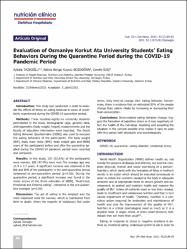Evaluation of Osmaniye Korkut Ata University students' eating behaviors during the quarantine period during the COVID-19 pandemic period
Künye
Tazeoğlu, A., Kuyulu Bozdoğan, F. B. ve İdız, C. (2021). Evaluation of Osmaniye Korkut Ata University students' eating behaviors during the quarantine period during the COVID-19 pandemic period. Nutricion Clinica y Dietetica Hospitalaria, 41(2), 86-93. https://dx.doi.org/10.12873/412tazeogluÖzet
Introduction: This study was conducted in order to evaluate the effects of stress on eating behavior in cases of uncertainty experienced during the COVID-19 quarantine period.
Methods: Three hundred-eighty-six university students participated in the study. Demographic (age, gender) data, anthropometric (body weight, height) measurements and the faculty of education information were recorded. The Dutch Eating Behavior Questionnaire (DEBQ) was used to evaluate the eating behaviors of the participants. The body weight (BW), body mass index (BMI), body weight gain and DEBQ score of the participants before and after the quarantine applied during the COVID-19 pandemic period were recorded and compared.
Results: In the study, 203 (52.6%) of the participants were women, 183 (47.4%) were men;The average age was 21.9 +/- 1.7 years. A significant increase was observed in the BW and BMI of the participants in the post-quarantine period compared to pre-quarantine period (p=0.00). During the quarantine period, a significant increase was found in the mean scores of the three subscales of DEBQ, "Restricted, Emotional and External eating", compared to the pre-quarantine averages (p=0.00).
Discussion: The act of eating is the simplest and the most important need for survival, which is maintained from birth to death. When the majority of individuals feel under stress, they tend to change their eating behavior, furthermore, there is evidence that an estimated 80% of the people change their calorie intake by increasing or decreasing their food consumption.
Conclusions: Stress-related eating behavior change, triggers the formation of repetitive stress as it may negatively affect the health of the individual. Realizing and accepting the situation in the earliest possible time makes it easy to cope with this period both physically and psychologically.


















